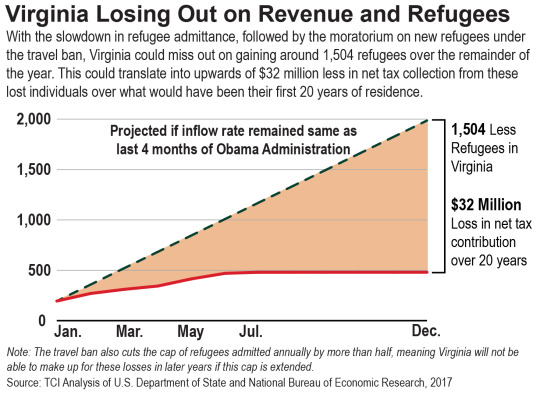July 5, 2017
Revived Travel Ban a Lose-Lose for Refugees and Virginia’s Economy
Starting tomorrow at midnight, the refugee ban section of President Trump’s executive order, commonly known as the travel ban, will go into effect. This will make it incredibly difficult for many refugees to enter the U.S. for the next 120 days unless they have a “bona fide” relationship with a close family relative. And this difficulty could likely extend longer, depending on if President Trump continues his executive order to lower the annual cap of refugees allowed into the U.S. beyond the fiscal year.
For Shaz Sadiq and her family, the Supreme Court’s decision to partially restore President Trump’s travel ban could not have come at a worse time. Sadiq and her family are scheduled to fly into Virginia tomorrow afternoon. Any delay in flights or holdup at customs could cost her family the opportunity to make a new life in the U.S., a process she and her family started four years ago when they fled religious persecution for their Christian faith and death threats in Pakistan.
While the damage to Sadiq’s family from being denied entry to the U.S. would be immeasurable, Virginia would also lose out from the likely contributions this family could have made over the years to Virginia’s economy and tax base. In a new working paper out by the National Bureau of Economic Research, researchers show refugees contribute tens of thousands more in taxes than they receive back in public benefits on average. Not only do refugees enrich our communities, making them more diverse and vibrant, but they are net contributors to our economy and public systems.

Since the Trump administration began, new refugee arrivals in Virginia have slowed down substantially; with the travel ban reinstated, there is a chance that Virginia may not see any more refugees for the remainder of the year. As a result, Virginia may receive around 1,500 fewer refugees this year than if the pace of refugee arrivals of the previous administration had continued. In dollar terms, Virginia and the federal government could be missing out on around $32 million in net tax contributions over the next 20 years from these refugees who never resettled in the state in 2017, assuming they were adults between the ages of 18 to 45. If this travel ban were to remain in place, the cumulative net losses to the state as a result of the absence of new refugee arrivals could add up to hundreds of millions of dollars.

For families like Sadiq’s, the revised travel ban threatens to delay or prevent entry to the U.S. after many years of preparation and applications. New research shows that refugees who arrived up to age 19 are likely to have similar educational attainment, earnings, employment, and labor force participation as their U.S.-born adult peers. However, the younger refugee children are upon arrival, the better their outcomes in education and language ability. Consequently, delaying refugee families from arriving in the U.S. poses real threats for the loss of productivity for our refugee children and future workforce.
A recent analysis of U.S. immigrants from Syria, a country that has large numbers of refugees and internally displaced people in need of resettlement, shows that overall this group is highly educated, entrepreneurial, and are major contributors to the economy. Compared to U.S.-born residents, Syrian immigrants are much more likely to hold advanced degrees, have higher earnings, and own a business. Syrian immigrants also tend to live in supportive enclaves around the U.S., like in the Washington D.C. metropolitan area, and can provide support networks for new Syrian refugee arrivals that extend beyond public benefits.
While refugees are generally families that are in perilous situations and have been undergoing vetting processes for multiple years to resettle in the U.S., many Americans continue to hold a common assumption that admitting refugees is purely an altruistic act by the U.S.
We now know that refugees are net-contributors, adding to the gross domestic product and tax base, and the recent ban hurts both vulnerable families seeking to resettle and our state’s bottom line.
Category:
Immigration
